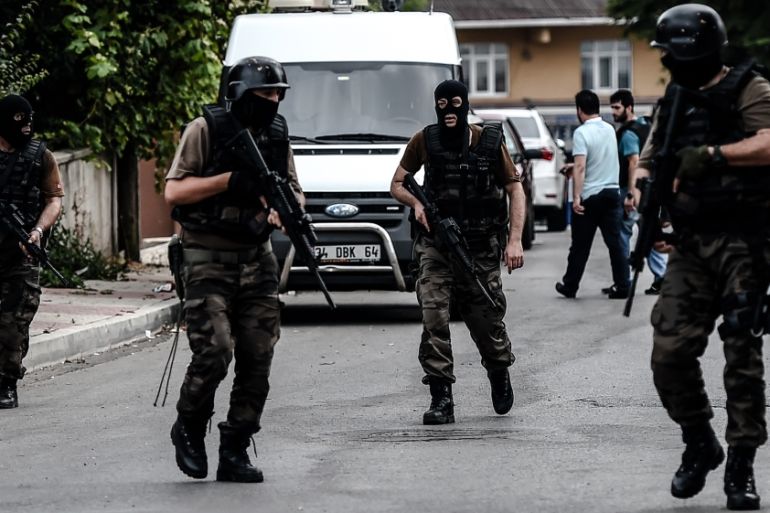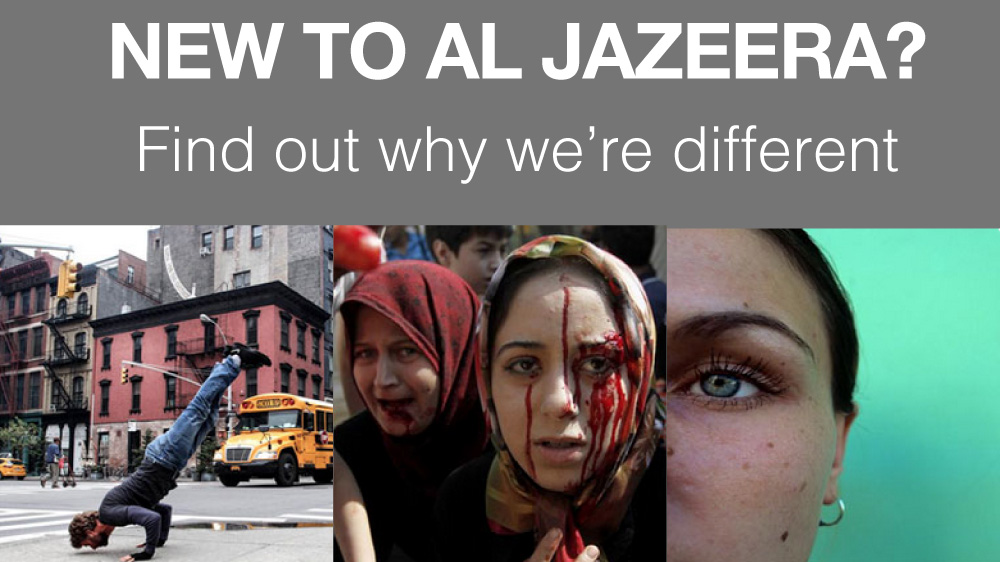Turkey’s summer of mayhem
Living in Turkey today means experiencing a creeping sense of dread – a sense that the animals have the run of the zoo.

The Suruc attack lit the fuse.
The political earthquake that shook Turkey on June 7 had been little felt in the lives of every day Turks when a suspected Islamic State of Iraq and the Levant (ISIL) bombing in the border town of Suruc on July 20, killed 33 young activists planning to deliver aid to the besieged, mostly Kurdish city of Kobane, across the border in Syria.
Keep reading
list of 4 itemsWorld Food Programme to end general assistance in northwest Syria
Erdogan open to meeting al-Assad but not to withdrawal from Syria
Middle East Roundup: What’s going on with Saudi Arabia and China?
The Kurdistan Workers’ Party (PKK), a militant group that has battled Ankara for more than 30 years but agreed to a ceasefire with the government in late 2012, responded by renewing its attacks, blaming Turkey for ISIL’s aggression.
RELATED: Suspected ISIL bombing worries Turks
Ankara declared war on ISIL and the PKK, which the US and EU view as a terrorist group, and began rounding up suspects of both those groups, and of the Marxist outfit, the Revolutionary People’s Liberation Party-Front (DHKP-C).
It also began bombing PKK camps in the Qandil Mountains of northern Iraq, and later agreed to let the US fly anti-ISIL sorties from its military bases in the country’s southeast.
Bloody Monday
Then came bloody Monday, in which a car bomb exploded outside an Istanbul police station, followed by a firefight, a shoot-out outside the US consulate in the city’s Sariyer district, and several PKK attacks in the country’s southeast.
By day’s end, nine people were dead, including six members of Turkey’s security services.
|
|
| Turkey struck by series of attacks |
Three groups have since raised their hands to claim the Istanbul attacks – the DHKP-C (US consulate), the PKK (police station bombing and shootout), and the little-known far leftist group the People’s Defense Units.
Who’s in danger these days? A better question is who’s not.
In the past week, assailants opened fire on officials of the ruling Justice and Development Party (AKP), Alevi leaders, American diplomats, and a top footballer driving down the street.
PKK attacks have killed about 30 members of Turkey’s police and security forces.
Turkey’s bombing campaign against the PKK has killed nearly 400 militants and at least eight civilians, according to local residents.
Warnings of possible attacks
The UK has advised Britons to avoid all buses and trains in Istanbul. City police have warned all security units of possible terrorist attacks on Istanbul’s metro system.
|
…Turkey’s government has, over the past 18 months, purged hundreds of police and intelligence officials linked to US-based cleric Fethullah Gulen, significantly weakening its security apparatus.
|
Ankara has detained more than 1,000 people since July 20, and nearly 850 of them are linked not to ISIL, the DHKP-C, or the PKK, but to the Peoples’ Democratic Party (HDP) – the Kurd-rooted political party that received 13 percent of the vote in the June 7 election.
The HDP’s unprecedented entry into parliament pushed the AKP from its roost and shook Turkish politics to its core.
This tension, between the AKP and the Kurds (both the HDP and PKK), lies at the root of the recent spurt in violence.
HDP co-chair Selahattin Demirtas has repeatedly called for both sides to “silence their weapons”.
But on Sunday he urged the government to keep its distance from ISIL and accused the AKP of using the war to reverse its electoral defeat.
President Recep Tayyip Erdogan has called for investigations into the HDP’s links to “terrorist groups” and sued Demirtas for a perceived insult in regards to the Suruc attack.
Creating a false dichotomy
Erdogan has long used polarising rhetoric to create a false dichotomy, of us (those who are for the AKP and for Turkey’s continued rise) and them (an amorphous group of people who are supposedly against it).

Suddenly there are a half dozen “thems”, a vague, fearful “us”, and little between the two.
To live in Turkey today is to experience a creeping sense of dread, a dawning sense that the animals have the run of the zoo.
Why can two Kurdish militants carrying a grenade launcher and an AK-47 stroll up to a police station in broad daylight in a small city in southeastern Turkey and stage a brazen assault?
Why is it that gunmen are able to ambush an Istanbul bomb scene investigation and kill a police chief?
Perhaps because Turkey’s government has, over the past 18 months, purged hundreds of police and intelligence officials linked to US-based cleric Fethullah Gulen, significantly weakening its security apparatus.
INTERACTIVE: Turkey roundtable: War at two fronts?
Or because the country is simultaneously at war with anti-Islamist Marxists, separatists, and radical Islamists, even as its elected leaders (purportedly) try to stitch together a government while facing a slowing economy and some two million refugees snatching up jobs and housing.
Path towards chaos
One friend, a successful young professional, is avoiding malls and public spaces like Taksim Square.
A college student worries about a snowball effect – that the violence and hate will continue to increase.
A public servant wonders if a government will be formed soon, and whether it will even help.
|
|
| On Al Jazeera: Turkey’s precarious peace with the Kurds |
Older Turks see visions of the late 1970s, when horrific violence – such as the gunning down of 34 people on Taksim Square – was commonplace. The result was martial law in much of the country and, ultimately, a military coup.
In Istanbul these days, the sun is high. The days are long, humid, and lazy. But there’s mayhem all around.
It feels a bit like like Gotham in the unsettling Christopher Nolan film The Dark Knight.
Just as everything begins to fall apart, the Joker explains the best way to terrorise a society: “Introduce a little anarchy… Upset the established order, and everything becomes chaos.”
Turkey’s established order has been upset. A little anarchy has been introduced. Barring cooler heads, chaos awaits.
David Lepeska, is a freelance journalist based in Istanbul. His work focuses on Turkey and the Middle East.
The views expressed in this article are the author’s own and do not necessarily reflect Al Jazeera’s editorial policy.
